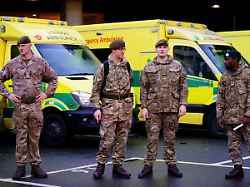Soldiers drive ambulances
Hardly any space in clinics: Britons should minimize risks
12/21/2022 8:06 am
The situation in the British healthcare system is aggravated by the current strikes. The medical director of the health service is now admonishing the British to reduce risks in order to create fewer emergencies. They should buy medicines, pay attention to relatives and drink less alcohol.
In the face of a strike by ambulance drivers, the British health service NHS has called on the population to avoid all emergency risks. “People can help by taking sensible steps to protect themselves and others at this time and not end up in the emergency room,” said Stephen Powis, NHS Medical Director in England. This includes drinking alcohol responsibly, looking out for family members or neighbors, and stocking up on medication.
Secretary of State Will Quince had previously warned against contact sports and “risky activities”. Ambulance drivers plan to go on strike across much of England and Wales today, Wednesday, to back their demands for higher wages and better working conditions. The NHS urged people to use the emergency services “wisely” and only call an ambulance in a life-threatening emergency. The union had promised that urgent emergency services would not be affected by the strikes.
However, the waiting times for ambulances are already significantly longer than originally planned. 750 soldiers are to step in during the strikes and drive ambulances. However, they are not intended for emergency use, but rather for transport. Another strike is planned for December 28th.
Already on Tuesday, tens of thousands of nurses and hospital staff went on strike for the second time in a week. The conservative government points out that its tariff offer is in line with the proposal of an independent expert commission. Wage increases beyond this cannot be financed. The NHS is chronically underfunded. Infirmaries are overcrowded. In emergency rooms, ambulance crews sometimes wait several hours to hand over their patients.
